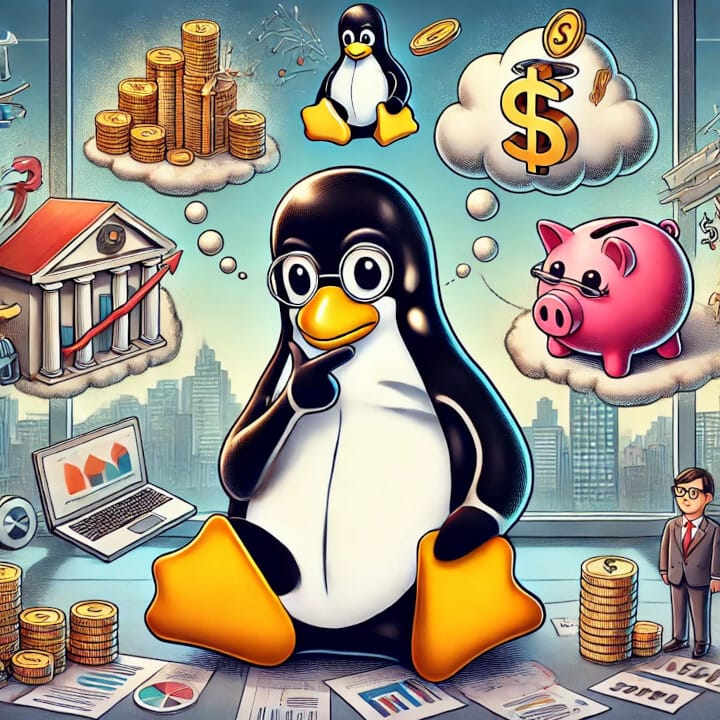
Decisions! Decisions!
The other day, Dan Lorenc, CEO and co-founder of the software supply chain company Chainguard, wrote on LinkedIn that "open source is not a good strategy for startups."
What? Do you think I was going to disagree because I'm a big open-source fan? Think again!
Yep, it's a great development model, but it never has been, isn't now, and never will be a business model. I am so, so tired of seeing people confusing them.
Lorenic continued, "There are many open-source strategies that can lead to financial success, and some are easier than others or more relevant to certain use cases than others."
That's true, too. Just ask Red Hat. A dozen years ago, Red Hat became the first billion-dollar open-source company not because it offered a great Linux distro—although Red Hat Enterprise Linux (RHEL) certainly is that—but because the company paired it with an excellent support offering.
Let me take you back to 2003. Red Hat is selling Red Hat Linux in retail boxes. It was a business, but it wasn't a big business. As Paul Cormier, then Red Hat's vice president of engineering, told me years later, "The people who were here during that period sometimes forget the leap we took, and there's a lot of people who are at Red Hat now who don't understand what a big moment that was in our history. We literally stopped our product line."
Needless to say, at this remove it all worked out.
However, it was the enterprise support model that made Red Hat its cash, not the open-source model per se.
You can also use open source as a top-of-the-funnel offering to get customers to pay for your company's other offerings. Strapi, for example, does well by using its eponymous headless content management system (CMS) to get its customers to buy into its other offerings.
A close relative and more popular version of this take is open core. Here, the idea is to offer a free, open-source version of a core program and then offer commercial proprietary versions or add-ons. More companies than I can name use this model. Their numbers include Automatic, Docker, and GitLab.
Another, less-talked-about model is one I call building-block open source. Here, the company doesn't offer its core program as open source. Instead, it offers useful open-source components and libraries that you could build a useful program from, but it's just easier and cheaper to use the company's offering.
Joe Morrison, a map specialist, has pointed out that Mapbox, a custom online map vendor for websites and applications, has been very successful with this approach. As he wrote, "You’ve seen their maps, even if you don’t know it — their clients range from Snapchat to Tableau to the New York Times. They aim their product at developers trying to build an app that just happens to need a map interface in order to make sense — which in today’s world of phones perennially in pockets, is honestly kind of hard to avoid."
Notice something about all these business plans? They're all fairly sophisticated.
Lorenc observed that many "open-source" startups are "afraid of sales and selling."
It took all their courage to get venture capitalist or angel investment funding. After all, they're developers first and business people a long way second.
That seems to be endemic in tech startups. Way back before open source even existed, when I first started working in tech, I saw business after business fail. Why? Their founders may have been great network engineers, developers, or system administrators, but they were helpless as babies at Business 101. In particular, they were clueless about sales.
If you don't know the nuts and bolts of turning your great idea into sales, find someone to partner with who does.
As Lorenc pointed out, "It's never easy to monetize an open-source project. It's doable, but it's not easy. If you're not 100 percent sure on how you're going to monetize, with evidence that it will work, future-you is in for a world of hurt." He's right.
Lorenc doesn't think building a community will help you in the long run because "they will inevitably slow you down." Here, we disagree.
I think, though, that simply assuming a community will somehow miraculously help you turn your open-source project into a viable business is foolish. Find an open-source community expert like my friend Jono Bacon and read books such as People Powered and The Art of Community. Once you know what a community can—and can't—do for you, then you can make an intelligent, informed opinion.
Finally, Lorenc and I are in complete agreement when he wrote if you "do open-source your core product, please, please, please don't start getting bitter and referring to users (or competitors) that make use of the licenses you provided as freeloaders or complain that they're taking advantage of you."
Dumping open source ends up ticking off your customers and partners, and you'll never be welcome in open-source circles again. And, then, where will you find programmers for your next "can't miss project?"
Other noteworthy Linux and open-source stories:
Take a demo, get a Blackstone Griddle
Automate expense reports so you can focus on strategy
Uncapped virtual corporate cards
Access scalable credit lines from $500 to $15M



